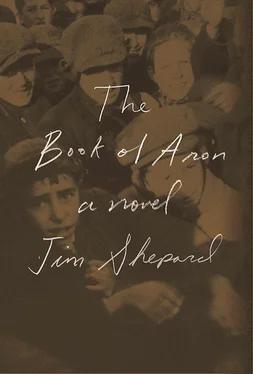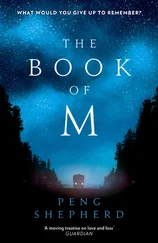OF COURSE THERE WASN’T ENOUGH FOR EVEN THE makeshift sets and costumes that Esterka had planned, Korczak told me early the next morning, standing over my bed, so it was time for Don Quixote and Sancho Panza to go back out on their rounds. I told him I didn’t know what he was talking about and he said he was used to that. When I told him I didn’t want to go he said he was used to that too.
“Can’t someone else go?” I asked him. I was afraid of Boris.
“Madame Wilczyńska asked recently why I was so taken with you,” he said, while he waited for me to find my shoes. “I don’t see what’s so puzzling about it.”
There was a boy out there who wanted to kill me, I told him. I didn’t look at him when I spoke.
“You’ll be fine with me,” he said. At the front door he stopped outside and pretended to check his pockets until I got the courage to follow. He told me I’d be awarded a Good Care Card for looking after one of the new arrivals. The card could be exchanged for an extra portion of sweets.
Again the only ones out that early were the beggars. Some were still in their nooks with their garbage and others were wrapped in their odds and ends and crossing from person to person and begging. A boy who looked like my older brother had printed on his armband Jew Useful for the Economy . When he caught my eye he bared black teeth at me. “And how are you?” he said. “What time is left on your clock?” He kept his horrible expression even when Korczak gave him a few groszy. An elderly couple went around the three of us with their eyes on the sidewalk as if looking for something they’d lost.
The first house we tried gave Korczak all the money he needed after he described the play and then had a coughing fit. “Well, that’s good news,” he said, but once we started back two bodies in the street covered with sheets of paper made him stop. Where the papers weren’t weighed down with stones they lifted in the wind.
We passed a mantelpiece clock wrapped with rope. “You know, when I was a medical student I used to sit at night in the postmortem room after hours,” he said, after we started walking again. “I paid the guard to let me stay there.”
I was scratching at lice. Even at the end my mother begged me to use the kerosene every day. Even at the end I lied about it. In the hospital I shouted for her to leave it alone and she turned to the wall and told me to go.
Korczak took my arm and almost tipped us over. “I just sat there and stared at the faces of the dead children,” he said. “What was I doing there? What was I looking for?”
A yellow police column jogged by. He looked bothered by his question, so I told him I didn’t know.
“What a strange and unsavory person I was. And am,” he said. He said he wished he’d brought a cigarette. He said he wished he’d eaten his breakfast.
“I’m not sure I know what to do with good times,” he said. “My mother told me her father was so comfortable with being downtrodden that even when he drew the lucky number in a lottery he kept the news to himself for a week.”
We stepped over a desk blocking the sidewalk, its drawers open and inkwell broken. He wondered if it was worth sending some boys back to retrieve it. Then he said to remind him that he still needed to talk with Kramsztyk about the poor quality of his coal. For the rest of the walk back he rolled his head from side to side as if his neck was giving him pain.
AUDITIONS FOR THE PLAY WERE HELD ON THE THIRD floor after it had been prepared. Gieńa was cast as Sudah the flower girl, she told me that night, and I told her that she was already in costume. Jerzyk though he still had his fever was cast as the fakir and had already started working on his magic tricks. They were casting the main role last, Korczak said, and he wanted me to try out for it. I asked what it was and he wondered if I’d read the play and I said no. He said the lead was a boy who was dying and inspired everyone.
“He’s the hero?” I said. We were all stripping beds.
“In a way,” he said. “I think you’d be very good at it.”
“Him?” Madame Stefa asked.
Him, Korczak told her. I said no but was surprised by how happy it made me to have been asked. The next day Korczak announced the star would be a boy named Abrasha, who played the violin.
I was emptying the dustbins with Zygmuś and another boy and saw Boris coming down the street with a tall woman in a straw hat. It didn’t look like he’d seen me and when I got back inside I pushed past the long line of kids waiting for the bathroom and went up to the third floor and climbed inside a painted piece of scenery that said Lord Mayor’s House . I waited and then heard footsteps and someone came in and shut the door. I could see out the crack beside me.
The woman in the straw hat and Korczak had come in but I didn’t see Boris. They searched each other’s faces and said it was good to meet again. He told her about the play and she told him how she’d gotten into the ghetto. She said she’d brought honey cakes and vitamin B for the children and he thanked her.
They were quiet. He asked why she had come and she told him she’d come to get him out of there and he said he thought it was something like that. He asked how she imagined she would do that and she said she belonged to the Żegota movement, which distributed newspapers calling on Poles to help Jews, and they ferried people in and out all the time. He asked if he would be going alone. She said that maybe as many as three or four others could go with him. Then she was quiet again.
I could hear the kids downstairs. Someone tried the door and found it locked and went back down.
“I ask you to accept my help,” the woman said.
“Those of us who were here, if we ever met up after this,” he finally told her. “How could we look each other in the eye without asking, ‘How is it that you happened to survive?’ ”
The woman studied her hands. “Why shouldn’t some, if even only a few, be saved?” she asked.
Someone dropped dishes downstairs and kids applauded.
What about the rest, he asked. Could she imagine the ones left behind? “ ‘Pan Doctor is gone. Wait here in the dark,’ ” he said.
I couldn’t tell if the woman was weeping. “We put out a newspaper,” she said. “You produce plays. What good does either do? Maybe we should be learning how to handle a rifle instead.”
Korczak laughed. “I’d love to join the underground but what weapons do they have?” he said. “One group has a revolver. They showed me.”
“You can come out now,” he called after they sat there a while longer, and I stood up and walked around the scenery. The woman didn’t seem surprised to see me. “You can help me show Maria out,” he said. “She’s one of my most successful graduates.”
“The boy with her is the one I was talking about,” I told him. But he didn’t answer and we followed him down the stairs. When I hung back he told me to come on and in the front hall he kissed the woman on both cheeks and then she kissed him on the mouth. Boris stood beside the door and watched them and then looked at me as though he’d never seen me before.
“Please think about what we discussed,” the woman told Korczak.
“I wish I could stop thinking about it,” he told her. “Please thank your friends on the children’s behalf.”
“Have you fallen asleep?” he said to me after they’d closed the door behind them. “Are you just going to stand there and squint?”
In the kitchen he was stopped by a little girl. “You’re the tenth person to ask me about the honey cakes,” he told her. “Do you think there are no problems to solve other than the honey cakes?” She went to Madame Stefa, who gave her a hug. “Do I need to have eyes in the back of my head to keep everyone working?” he called to the group.
Читать дальше












